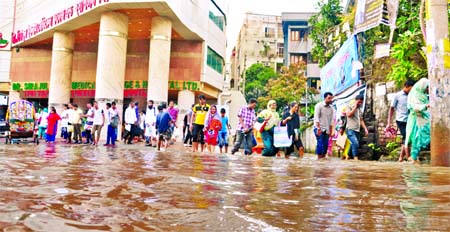
Staff Reporter :About one and a half hours rain on Monday inundated most of the low-lying areas of the eastern part of capital Dhaka creating one of the worst traffic congestions.Low-lying areas like Badda, Rampura, Moghbazar, Mouchak, Malibagh, Khilgaon, Chowdhurypara, Basabo and Shantinagar went under knee-deep water. Beginning at 11:00 am, the rain started to fall heavily around 12:00 noon and continued for about one and a half hours, submerging a number of city streets and low-lying areas.Hundreds of people were stranded at bus stands and road dividers. With the collapse of the transport network, most people were left with no choice but to wade their way back home through knee-deep water.Besides, the rain also caused immense sufferings to dwellers in New Market, Siddhesawri and old Dhaka. Filthy water entered roadside business establishments, shops and houses in low-lying areas of the city, making the lives of traders and residents miserable. As the roads, lanes and by-lanes are narrow it was very difficult to pass the rainwater. The rainfall, which is caused due to an active monsoon, may continue for the next two days, an official of Met Office said.It said, the axis of monsoon trough runs through Gang tic West Bengal to Assam across Southern part of Bangladesh. One of its associated troughs extends to North Bay. Monsoon is fairly active over southern and northeastern part of Bangladesh and weak to moderate over North Bay.Light to moderate rain or thunder showers accompanied by temporary gusty wind is likely to occur at many places over Chittagong division and at one or two places over Rangpur, Rajshahi, Dhaka, Khulna, Barisal and Sylhet divisions, an official of Met Office said.

